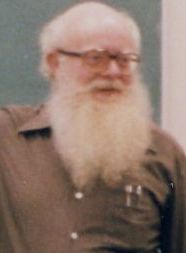
In Memoriam: William J. Kurmey
William J. (Bill) Kurmey, former Professor and Dean of the School of Library and Information Studies at the University of Alberta, died Sunday, 15 November 2015, in Edmonton, Alberta. He was 75.
William J. Kurmey was born in British Columbia in 1940, and received an undergraduate degree in chemistry from the University of British Columbia, and earned his master's degree in library science from the University of Chicago, writing a thesis entitled "An Evaluation of Automatically Prepared Abstracts and Indexes." Prior to coming to the University of Alberta, Bill worked in library and computer management positions in British Columbia, New York, and Illinois, and then assumed a position as Associate Professor in the Faculty of Library Science (FLS, but now the Faculty of Information), University of Toronto, where he developed many of the first FLS' courses in information systems (what was termed "automation", during this period) and information storage and retrieval.
In the mid-1970s, in order to teach the University of Toronto FLS library school students about computers and computing (most of whom had no experience with, nor affinity for, computers), Bill designed a very simple programming language and had the students write machine-level programs to perform some basic library processes, such as sorting. The students then encoded their programming routines on punch cards, and then submitted their jobs to the mainframe input/output room to see if the programs would compile, run, and most importantly, get the desired output. It was an innovative, challenging, and novel way to introduce the students to the concepts of computing, and it reflected Bill's idiosyncratic and unique approach to teaching and learning, and it also illustrates the important emphasis he placed on self-discovery and exploration in the learning process.
He was hired as SLIS' fourth Dean in January 1980, serving ably in that position until he resigned the office of the Deanship at the conclusion of his term as Dean in 1984. His greatest success as Dean, in his words, was ". . . achieving recognition on the part of the profession that we were there, and were willing to work with the profession and involve them in our program." Professor Kurmey also viewed as a significant achievement the reorganization of the curriculum, and he worked to introduce technology into all the courses, as well as to initiate courses to meet the concerns of the profession with regard to management training. In support of his goal as Dean to raise SLIS' profile and stature in the library community, Bill attended many formal and informal symposiums and conferences as a representative of the School. As an aside, Bill's amazingly spirited dancing at the Library Association of Alberta's annual conferences at Jasper Park Lodge was an annual conference highlight!
After his tenure as Dean, Professor Kurmey remained on staff at the School as a Professor, with his teaching responsibilities focused on the increasingly important areas of computer technology, information management, and information retrieval. In addition to his teaching activities, Bill carried out a robust research program, authoring numerous scholarly articles, co-authoring an important monograph with Bruce B. Peel (former Chief Librarian of the University of Alberta Libraries) on cooperation among Ontario university libraries (Cooperation Among Ontario University Libraries; Council of Ontario Libraries, 1983), and writing the definitive book chronicling the intersection of libraries and the programming language COBOL (Common Business Oriented Language), the 432-page COBOL Programs for Libraries (Scarecrow Press, 1990).
Bill Kurmey served as Professor at the School until May 1992, when he left SLIS to join the University of Alberta Libraries (UAL) as a Research Consultant in the Information Technology Services (ITS) division, where his expertise was invaluable in the installation and refinement of several new computer systems. Despite the fairly significant leap from academe to a working IT service department, Bill took on the role of tech support with grace, commitment, and energy. While his methods were sometimes unorthodox, his depth of knowledge was immense, and he enjoyed the technical troubleshooting, and the interactions with library staff throughout the UAL system. Bill particularly enjoyed working on special projects, and delighted especially in testing and remediating security vulnerabilities in the Library's systems and in the University of Alberta campus network.
Bill was generous with his technology enthusiasms, securing computer hardware from California for his friends and colleagues, and donating countless hours of his time to helping many of those less "techy" set up, configure, and troubleshoot their computers. The "computer doctor" (i.e., Bill) would show up at one's house with his black satchel-a black bag containing all manner of computer forensic and diagnostic tools-and then proceed to perform his arcane "alchemy," setting up or restoring one's computer into good working order. And the good computer doctor always made house calls!
After his retirement from the University of Alberta Libraries, Bill continued his active consulting practice, investigating and strengthening banks' data security processes, and planning and implementing information systems in both businesses and libraries. Post-retirement activities also included travel, gold panning, and an activity that was almost on par with his passion for computer technologies: knitting. Bill was an avid and accomplished knitter for many years; in fact, as an undergraduate student at the University of British Columbia, he earned money by teaching classes in knitting and in ballroom dancing!
Bill will be fondly remembered by friends, former students, coworkers, and the larger SLIS community, and we respectfully acknowledge his service and contributions to the School, the University, and the profession of librarianship.
Compiled from the writings of Robert Brundin, with contributions from Gretchen Brundin, Michael Brundin, Robin Inskip, Aaron Kurmey, and Doug Poff.